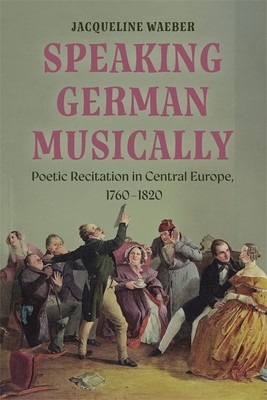
- We will send in 10–14 business days.
- Author: Jacqueline Waeber
- Publisher: Boydell Press
- ISBN-10: 1837652147
- ISBN-13: 9781837652143
- Format: 15.6 x 23.4 x 2.9 cm, kieti viršeliai
- Language: English
- SAVE -10% with code: EXTRA
Speaking German Musically: Poetic Recitation in Central Europe, 1760-1820 (e-book) (used book) | bookbook.eu
Reviews
Description
Shows how poetic recitation and the interweaving of music and poetry contributed to the advent of a German identity in late eighteenth- and early nineteenth-century Europe.
The art of reciting a text out loud, known as Vortragskunst, be it in a private circle or in a concert hall, originated in German-speaking countries in the 1760s, and by the nineteenth century had become a well-established practice subjected to an artistic blossoming unparalleled in the rest of Europe. In this book Jacqueline Waeber explains and examines how and why this happened, focusing on the origins of poetic recitation and its development during the late eighteenth and early nineteenth centuries, a period essential to the development of modern German literature and theatre, bookended by the two main figures who contributed to the theoretical and aesthetical tenets of poetic recitation, the poet Friedrich Gottlieb Klopstock (1724-1803) and Johann Wolfgang von Goethe (1749-1832). Poetic recitation quickly gained attraction for the Lied and the musical melodrama, both musical genres that were driven by a search for new declamatory styles. As a result, poetic recitation became increasingly 'musicalized' by the frequent addition of a musical accompaniment. As the book shows, this intertwining of music and poetry makes a huge contribution to the advent of German identity through the reappraisal of its language.EXTRA 10 % discount with code: EXTRA
The promotion ends in 23d.18:31:30
The discount code is valid when purchasing from 10 €. Discounts do not stack.
- Author: Jacqueline Waeber
- Publisher: Boydell Press
- ISBN-10: 1837652147
- ISBN-13: 9781837652143
- Format: 15.6 x 23.4 x 2.9 cm, kieti viršeliai
- Language: English English
Shows how poetic recitation and the interweaving of music and poetry contributed to the advent of a German identity in late eighteenth- and early nineteenth-century Europe.
The art of reciting a text out loud, known as Vortragskunst, be it in a private circle or in a concert hall, originated in German-speaking countries in the 1760s, and by the nineteenth century had become a well-established practice subjected to an artistic blossoming unparalleled in the rest of Europe. In this book Jacqueline Waeber explains and examines how and why this happened, focusing on the origins of poetic recitation and its development during the late eighteenth and early nineteenth centuries, a period essential to the development of modern German literature and theatre, bookended by the two main figures who contributed to the theoretical and aesthetical tenets of poetic recitation, the poet Friedrich Gottlieb Klopstock (1724-1803) and Johann Wolfgang von Goethe (1749-1832). Poetic recitation quickly gained attraction for the Lied and the musical melodrama, both musical genres that were driven by a search for new declamatory styles. As a result, poetic recitation became increasingly 'musicalized' by the frequent addition of a musical accompaniment. As the book shows, this intertwining of music and poetry makes a huge contribution to the advent of German identity through the reappraisal of its language.

Reviews